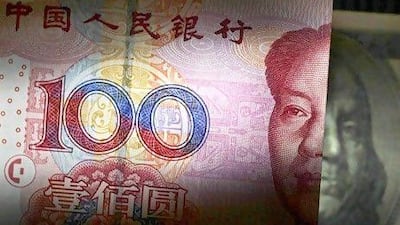When the credit crisis damaged the ability of trading partners to borrow dollars, Beijing's currency flourished, especially in Africa and the Middle East, Gavin du Venage writes
Until recently few people outside Asia would have been able to name China's currency.
Today, the yuan is being embraced around the world as a future competitor to the dollar, and nowhere more enthusiastically than in Africa and the Middle East.
Since the Second World War the dollar has ruled, almost unchallenged, as the currency of choice in which to trade commodities.
The euro has earned its place at the table, but in the hard world of oil and mineral dealing, the dollar remains king. When Iran launched an oil exchange based on the euro a few years ago in a bid to shake loose the dollars' grip on the crude market, the world barely took notice.
Over the past few years however, a new contender has entered the ring.
In 2008, the global credit crisis ravaged the ability of importers and exporters to borrow dollars. For China, dependent on exports, this was an alarming event.
As a result, it has started to quietly encourage trading partners to settle more of their bills in yuan.
In 2010, it allowed the yuan to be bought and sold outside the mainland for the first time. Since trading restrictions were lifted, albeit partially, the market for the yuan has now grown to the hundreds of millions of dollars a day. The currency, also known as the renminbi,has also appreciated in value since Beijing loosened its peg to the dollar in June.
"Chinese companies are happy to bypass the dollar," says Peter Poon, a yuan sales and product development specialist at Standard Bank in Johannesburg, Africa's largest bank by assets. "And African companies have been very receptive to the idea of switching to yuan-based transactions".
So receptive Standard Bank expects at least 40 per cent of the US$100 billion (Dh367.32bn) in trade between Africa and China each year to be settled in yuan by 2015. The bank has branches in 17 countries on the continent, and is moving to providing yuan deposits and withdrawals at all of them.
Much of the uptake is by the thousands of Chinese companies operating across Africa. The yuan is used to pay suppliers back home, settle debts and pay employees. And African companies doing business with Chinese sub-contractors are also switching to yuan to pay their bills.
"It maximises efficiency," says Mr Poon. "It also saves transactional costs involved in converting from a local currency like the South African rand, to dollars, then to renminbi,"
Elsewhere, a similar trend is unfolding.
"In the Middle East, [yuan] traffic with the UAE almost doubled and volumes with Qatar continued, while traffic from Bahrain and especially Kuwait built up," said the financial messaging network Swift. "And we see for the first time significant volumes with South Africa, due to a whopping tenfold increase since October - definitely a country to put on your [yuan] watch list."
It's not just businessmen who are snapping up yuan by the handful. National treasuries of the major commodities exporters are now also beginning to add Chinese currency to their holdings. In January the UAE and Beijing announced a currency swap, a deal which saw about Dh20bn deposited with the People's Bank of China - Beijing's central bank - in exchange for 35bn yuan added to the emirates' coffers.
Last year, Nigeria's central bank said it would eventually hold 10 per cent of its foreign reserves in yuan. According to Standard Bank, other countries are considering doing the same.
Some countries are going even further. South Sudan, the world's newest country, is said to be considering adopting the yuan as its national currency. Gideon Gono, Zimbabwe's powerful central bank governor, has also said publicly his country should adopt Beijing's coin to replace its own near-worthless Zimbabwean dollar.
Still, embracing another country's monetary system carries risks, as members of the Francophone bloc (CFA) of west and central African states learned to their cost. The CFA currency, created in the aftermath of the Second World War, was set at a fixed rate against the French franc and later, the euro.
The 13-member bloc enjoys the benefits of a stable currency, but it has also resulted in ceding an enormous amount of financial autonomy to their former colonial master.
China's ambitions may not extend to virtual control over African treasuries, as France's seem to be; but the yuan, for all the recent moves towards liberalisation, is still tightly tied to Beijing's apron strings.
"In practice, the yuan rise as a reserve asset is going to be very slow and maybe a lot slower than many people expect," says Daouda Cisse, a research fellow at the Centre for Chinese Studies at Stellenbosch University in South Africa.
He points out that within China itself, a debate is raging about just how much control over its currency to surrender to the free market. This would have to be resolved before the yuan could even begin to be considered a reserve currency.
At the same time, countries such as Nigeria, which derives 80 per cent of its income from oil sales, remain tied to the dollar.
However much it may desire to move away from the greenback, it is unlikely to be able to do so anytime soon.
For now, commodity economies may be content to build up Chinese currency holdings simply to grease the wheels of commerce with one of their most important trading partners. But it's only a matter of time before the yuan joins the euro and dollar as one of the world's great currencies.

